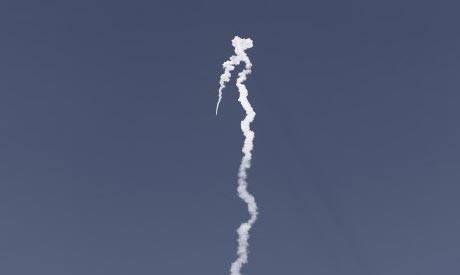
A trail of smoke from a missile is seen in the sky south of Tel Aviv November 2, 2011. Israel test-fired a missile on Wednesday, (Photo: Reuters).
The Israeli government would have significant support at home for an Israeli military strike against Iran's nuclear program, according to a poll published Thursday.
The poll was released following reports that Prime Minister Benjamin Netanyahu is trying to persuade Cabinet ministers to authorize such a strike and after Israel successfully tested a missile thought capable of carrying a nuclear warhead to Iran.
Forty-one percent of those questioned by the Dialog polling institute said they would back an Israeli attack on Iran's nuclear facilities, which many Israelis believe were built to produce bombs.
A similar number — 39 percent — oppose such an attack, which would be fraught with logistical difficulties and risk a deadly Iranian counterstrike and regional mayhem. Twenty percent were undecided.
The survey, published in the Haaretz daily, surveyed 495 people and had a margin of error of 4.6 percent. Although the poll appears to reflect a divided nation, the fact that four out of 10 Israelis support a strike is startling, given the implications for Israel. On Wednesday, Iran's military chief threatened a fierce retaliation against Israel should it attack Iranian nuclear installations.
It is unclear whether Netanyahu really would like to strike or is trying to prod the international community into taking a tougher line on Iran. This is not a decision he would be authorized to take alone, but would need the support of Cabinet ministers.
Israel considers Iran to be its greatest threat, citing Tehran's nuclear program, its president's repeated calls for destroying the Jewish state and Iran's support for Palestinian and Lebanese militant groups. For years, Israeli leaders have appealed to the world community to impose tough economic sanctions to pressure the Iranians to dismantle their nuclear installations.
Iran has consistently denied developing nuclear weapons, insisting its nuclear program is for peaceful purposes.
But they have also said Israel cannot tolerate a nuclear-armed Iran and consistently have not ruled out a military attack.
There are precedents for such a strike. In 1981, Israeli aircraft bombed an unfinished nuclear reactor in Iraq, destroying that country's nuclear program. Israeli warplanes also destroyed a site in Syria in 2007 that the UN nuclear watchdog deemed a secretly built nuclear reactor.
An attack on Iran's program would be substantially more difficult because Iranian nuclear facilities are scattered, and some are mobile and built underground. And because they are not concentrated at a single site, it would be extremely difficult for Israel to cripple the program in a single airstrike.
In this charged climate, the Israeli military reported on Wednesday that it successfully tested an advanced long-range missile said to be capable of carrying a nuclear warhead to Iran. Military officials also confirmed the air force conducted a drill last week with Italian warplanes in Sardinia.
International powers doubt Iran's claims that its nuclear program is developed to produce energy, not weapons, but their sanctions have so far failed to persuade Tehran to put its nuclear program under international inspection.
The UN nuclear agency is due to focus on the Iranian program at a meeting later this month. The West wants to set a deadline for Iran to start cooperating with an agency probe of suspicions that Tehran is secretly experimenting with components of a weapons program.
Short link: